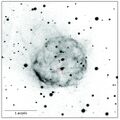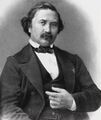Template:Selected anniversaries/March 11: Difference between revisions
No edit summary |
No edit summary |
||
| (39 intermediate revisions by the same user not shown) | |||
| Line 1: | Line 1: | ||
<gallery> | <gallery> | ||
|| | File:Nova_Scorpii_1437_AD.jpg|link=Nova Scorpii AD 1437 (nonfiction)|1437: Korean astronomers record the appearance of a new star, which shines for fourteen days before dimming. This astronomical event will later be known as [[Nova Scorpii AD 1437 (nonfiction)|Nova Scorpii AD 1437]]. | ||
File:Urbain Le Verrier.jpg|link=Urbain Le Verrier (nonfiction)|1811: Mathematician and astronomer [[Urbain Le Verrier (nonfiction)|Urbain Le Verrier]] born. | File:Urbain Le Verrier.jpg|link=Urbain Le Verrier (nonfiction)|1811: Mathematician and astronomer [[Urbain Le Verrier (nonfiction)|Urbain Le Verrier]] born. Le Verrier will predict the existence and position of Neptune using only mathematics, an event which will be widely regarded as one of the most remarkable moments of 19th century science. | ||
| | File:Joseph Bertrand.jpg|link=Joseph Bertrand (nonfiction)|1822: Mathematician, economist, and academic [[Joseph Bertrand (nonfiction)|Joseph Louis François Bertrand]] born. Bertrand will contribute to number theory, differential geometry, probability theory, economics and thermodynamics. | ||
|| | File:Niles Cartouchian and Anton Rhodomunde Confront Gnotilus.jpg|link=Niles Cartouchian and Anton Rhodomunde Confront Gnotilus|1823: Publication of ''[[Niles Cartouchian and Anton Rhodomunde Confront Gnotilus]]'' causes widespread debate about the role of private citizens in fighting crimes against mathematical constants. | ||
File: | File:Vannevar_Bush_(between_1940_and_1944).jpg|link=Vannevar Bush (nonfiction)|1890: Engineer and academic [[Vannevar Bush (nonfiction)|Vannevar Bush]] born. Bush develop the Differential Analyzer, initiate the [[Manhattan Project (nonfiction)|Manhattan Project]] and oversee government mobilization of scientific research during World War II, and make pioneering contributions to computer science. | ||
File: | File:Alexander Fleming.jpg|link=Alexander Fleming (nonfiction)|1955: Biologist, pharmacologist, and botanist [[Alexander Fleming (nonfiction)|Alexander Fleming]] dies. Fleming discovered the enzyme lysozyme in 1923, and the world's first broadly effective antibiotic substance benzylpenicillin (Penicillin G) in 1928, for which he shared the Nobel Prize in Physiology or Medicine in 1945 with Howard Florey and Ernst Boris Chain. | ||
</gallery> | </gallery> | ||
Latest revision as of 08:58, 11 March 2022
1437: Korean astronomers record the appearance of a new star, which shines for fourteen days before dimming. This astronomical event will later be known as Nova Scorpii AD 1437.
1811: Mathematician and astronomer Urbain Le Verrier born. Le Verrier will predict the existence and position of Neptune using only mathematics, an event which will be widely regarded as one of the most remarkable moments of 19th century science.
1822: Mathematician, economist, and academic Joseph Louis François Bertrand born. Bertrand will contribute to number theory, differential geometry, probability theory, economics and thermodynamics.
1823: Publication of Niles Cartouchian and Anton Rhodomunde Confront Gnotilus causes widespread debate about the role of private citizens in fighting crimes against mathematical constants.
1890: Engineer and academic Vannevar Bush born. Bush develop the Differential Analyzer, initiate the Manhattan Project and oversee government mobilization of scientific research during World War II, and make pioneering contributions to computer science.
1955: Biologist, pharmacologist, and botanist Alexander Fleming dies. Fleming discovered the enzyme lysozyme in 1923, and the world's first broadly effective antibiotic substance benzylpenicillin (Penicillin G) in 1928, for which he shared the Nobel Prize in Physiology or Medicine in 1945 with Howard Florey and Ernst Boris Chain.





